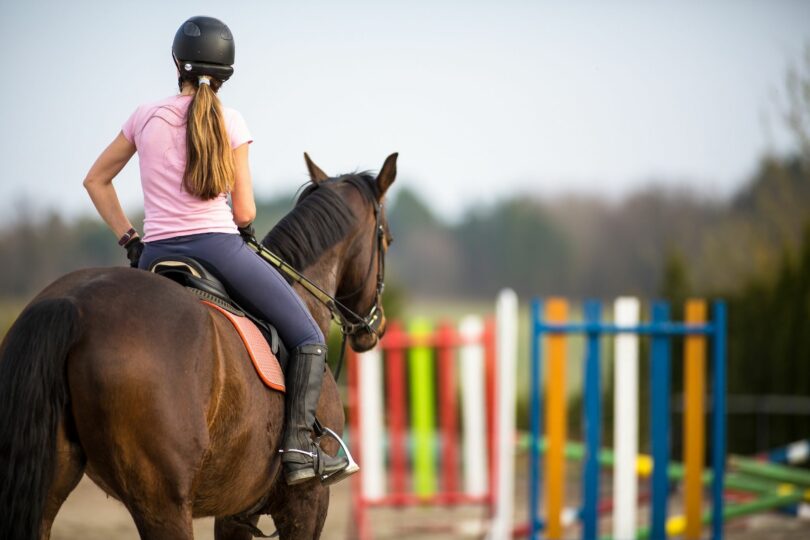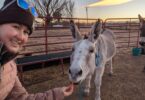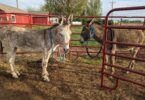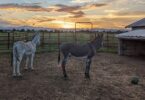Techniques for handling anxiety, show nerves & phobias
A fear of horses is more common than you might think. Regardless of whether it’s a fear you’re born with or one you develop, there are ways to overcome it.
Whether you have equinophobia, an anxiety disorder that causes unnecessary fear of horses, or have simply become afraid or anxious, there are ways you can manage. Practice tips to overcome anxiety and show nerves (like positive visualization). Work on building trust with your horse through lessons and groundwork. Last, have some quick and easy techniques on hand to handle your nerves in the saddle (like a fun riding game) and on the ground (breathing techniques).
Equinophobia, Hippophobia
Equinophobia and hippophobia are the technical terms for fear of horses. The first has Latin roots (Equus = horse), and the second is Greek (Hippos = horse, Phobos = fear).
People with equinophobia may also be afraid of mules, donkeys, or ponies.
What is the correct term for fear of horses?
Either equinophobia or hippophobia is correct. Equinophobia is more commonly used, as it’s based on a root more people recognize (the same root forms the words equine and equestrian).
What is a phobia?
Simply put, a phobia is a fear. More technically, a phobia is a type of anxiety disorder that causes unnecessary fear of something unlikely to bring you harm.
Phobias are often interrelated. According to the Cleveland Clinic, if you have equinophobia, you may also have:
- Zoophobia (fear of animals)
- Basiphobia (fear of falling)
- Traumatophobia (fear of injury)
- Acrophobia (fear of heights)
- Thanatophobia (fear of death)
How common is equinophobia?
Unfortunately, there’s no way to know for sure. Some people choose not to disclose their fears and others may not know they have them.
The Cleveland Clinic estimates that about 10% of American adults will deal with a phobia at some point, and equinophobia could be it.
General Fear of Horses
It’s possible to be afraid of horses and not have equinophobia. Also, fears can come and go throughout your lifetime.
They may be tied to a specific event, trauma, or accident (like a bad fall).
How common is a fear of horses vs. other animals?
Horses are a fairly common animal, even in cities (thanks to mounted police forces).
As such, someone is more likely to have a fear of horses (which they could see daily) than a fear of bats (which they may never see).
What might cause a fear of horses?
Equinophobia is more prevalent in women and people who have a family history of anxiety disorders or other phobias. It’s also possible to experience a gene mutation that can cause this disorder.
Fear can also be brought on by a negative or life-threatening experience.
If you’re bucked off, take a bad fall and break your leg or arm, get kicked by a horse, or are unable to stop a horse that takes off with you on it, you may develop a fear of horses.
What are some symptoms of equinophobia?
There are a few symptoms you can look for.
- Nausea
- Sweating excessively
- Dizziness
- Shortness of breath
- Upset stomach
- Chills
Horseback Riding Anxiety
Let’s face it: everyone who rides horses experiences anxiety at one point or another. It’s a fact of life with horses.
Maybe your horse got a bit wild at a show or you almost fell going over a log on a trail ride. Things like that can make getting back in the saddle scary, to say the least.
Causes
There’s not always a clear cause when it comes to anxiety. Some riders describe waking up one day and being nervous to get on. Sometimes, it’s linked to a specific experience.
Maybe you got kicked, stepped on, or bitten. Perhaps you fell off during a lesson or were nearly run away with.
Techniques to Overcome Anxiety
Fortunately, there are lots of ways that you can overcome, or at least mitigate, your horse-related anxieties.
Start with a simple visualization, or when you imagine yourself doing something successfully. Studies have shown that physically doing something (like folding a shirt) and picturing yourself doing that task causes the same cells in your brain to fire.
It’s a way to have the experience without actually having the experience.
Let’s say you’ve become anxious about mounting. Find someplace you’re comfortable and sit down. Close your eyes. Picture yourself at the barn, ready to ride, with your horse.
Walk yourself through the whole process, from entering the barn to the ring, to situating your horse at the block, to mounting.
The more you practice, the easier mounting will become. Bonus: you’ll experience less anxiety!
How to Build Confidence in the Saddle
Building riding confidence takes time. One of the best things you can do is work with a qualified trainer in an environment (an arena, field, or trail setting) where you’re the most comfortable.
Improving your skills will boost your confidence.
Make sure you and your horse are a good fit. If your horse is too green or too hot for you, you could be making your fears worse. Consider putting your horse in training for a couple of months while you take lessons on a ‘Steady Eddie’ to give yourself a boost.
Take your horse into consideration. Maybe you’re most comfortable in an arena, but your horse is super relaxed on trails.
Ride wherever your horse feels their best, and its calm, cool confidence will transfer to you.
Also, don’t ever force yourself to ride in a situation you know will be bad. If it’s a windy day and that makes your horse a bit nuts, stick to the arena or maybe just lunge.
Setting yourself up for success means knowing in what conditions you and your horse can perform at your best.
Show Nerves
No matter how well you know your horse or how long you’ve been riding, there’s something about a show that changes everything.
Your normally laid-back horse starts acting like a wild stallion, or you suddenly can’t remember which rein to use for a half-halt.
Causes
Being nervous is your body’s way of being prepared for danger. While this means more awareness and faster reflexes, this also can mean feeling more anxious or jumpy and experiencing migraines or nausea.
If you can, try to figure out why you’re nervous first.
Does something about the show environment (lack of fences, lots of strangers milling around, etc.) make you feel unsafe? Are you concerned with/feeling the pressure of performing well or even winning?
Once you’ve identified why your nerves are on high alert, it’s easier to work on calming them.
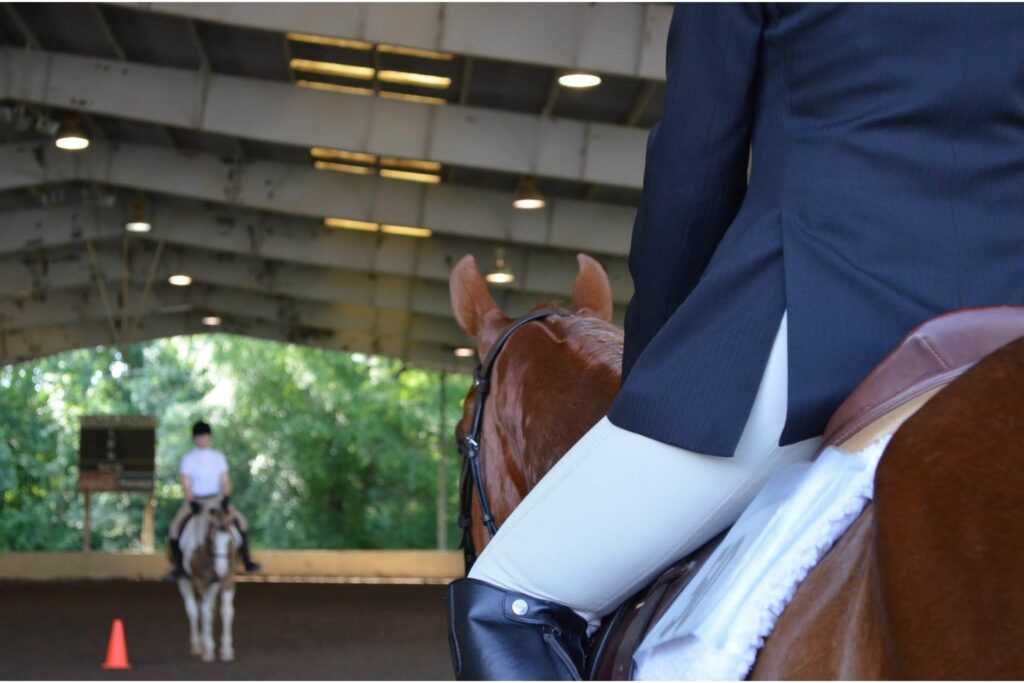
Photo Cred: Canva
Techniques to Overcome Show Nerves
Here is another place where visualization techniques can help. Picture everything you can about the show. The barns, the arenas, the jumps, the barrels, the other horses, the warmup arena, and your horse.
Go through a typical day, from tacking up to mastering your class to cooling down.
Ignoring or trying to eliminate your anxiety is likely to backfire. Instead, try to find a positive way to frame what you’re feeling.
Are you nervous your horse is going to act like a wild child? Frame it as you’re concerned your horse will hurt himself, and make a plan to lunge and do groundwork before you ride.
Terrified of getting a bad score? Change your mindset to the ride. Focus on executing all of the skills you and your horse have been working so hard to master.
How to Build Confidence in the Show Pen
The best way to build confidence in the show pen is to start from the ground. If you trust your horse, you’re less likely to be nervous and anxiety will have a harder time taking root.
Go back to the basics and spend some time on groundwork.
Practice communicating clearly and effectively with your horse, making sure he listens to and respects your commands. Groundwork lets you see the world from your horse’s point of view.
Learning to communicate nonverbally will strengthen your bond and give you that extra boost you need for show days.
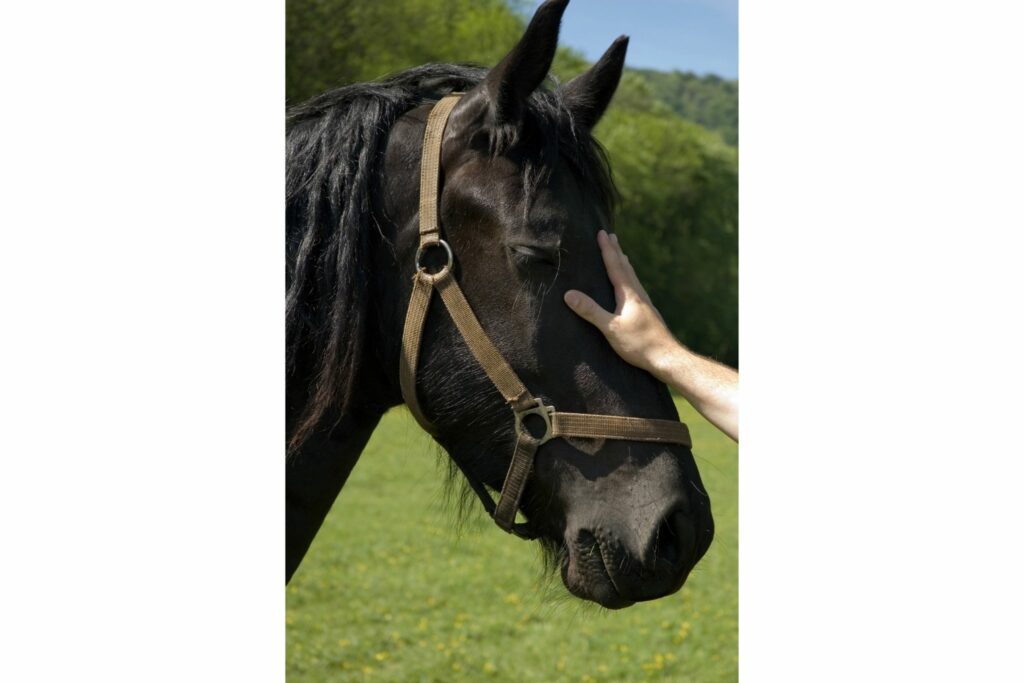
Photo Cred: Canva
Seven Tips for Nervous Riders
If your nerves are still running wild, here are seven tips you can try to tame them.
- Dedicate some time to lessons: If nerves are getting the best of you, only ride with an instructor for a while. If that’s not possible because of cost, make sure you ride with a friend (a friend with a calm, predictable horse works best). Strike up a conversation while you ride or make challenges out of patterns.
- Taking a lunging lesson on a schoolmaster: Don’t be afraid to relinquish control of the horse to the instructor. While they’re focusing on controlling the horse, you can focus on yourself. Strengthening your balance and position will only help your confidence in the long run.
- Ride the right horse: Sometimes, you just need some time on a horse who is calm, not inclined to spook, and who is super-dependable. Once your nerves are under control, you can move to a horse that’s more sensitive or less trained.
- Take it slowly: Not every ride has to be about trotting, cantering, or jumping. Don’t be afraid to just walk and work on the basics, like your horse being round or making perfect circles.
- Turn up the tunes: Sometimes, distraction is key. Pick your favorite radio station or playlist and play it over a speaker while you ride. You can two-point during the chorus, post to the beat, or even sing while you canter (to make sure you’re breathing).
- Make riding into a game: One of my favorite things to do when I’m nervous, or when the environment isn’t playing nice, is to use ground poles to set up patterns. Take four poles and make a square (you can adjust the size, but start bigger). Make serpentines, figure eights, weave, or even trot over them. The distraction is as effective for your horse as it is for you.
- Phone a friend for a ground day: Here’s another go-to favorite. When I had my first OTTB, I was nervous about cantering him. I asked one of my friends to stand in the middle of the ring so I could make a twenty-meter circle around them. They kept me talking and gave my horse something to focus on. This person can also walk next to you while you warm up.
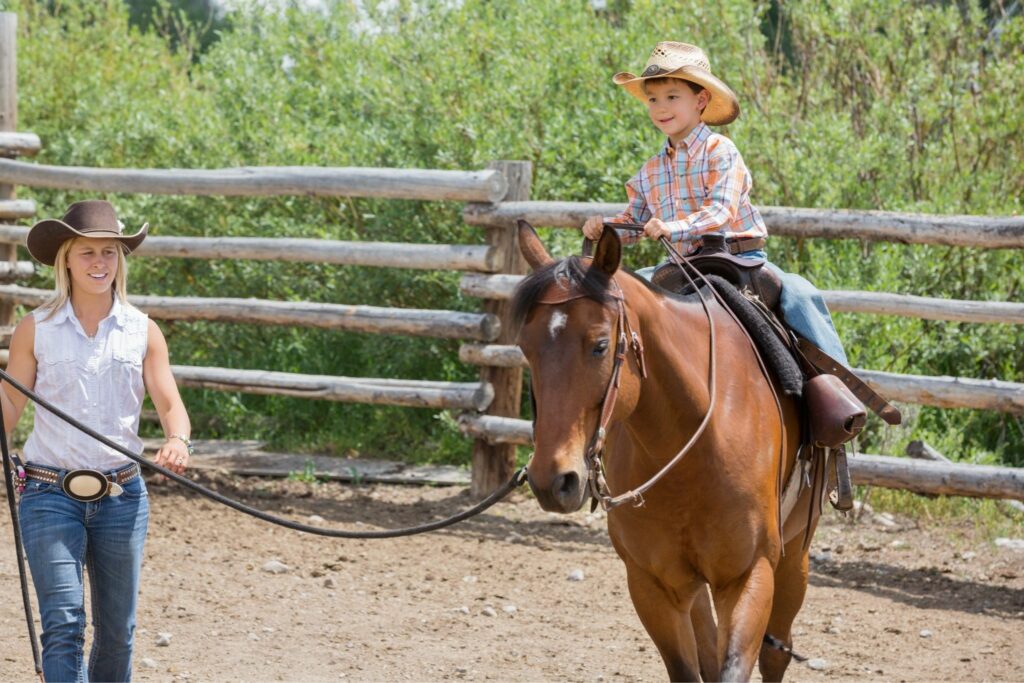
Photo Cred: Canva
Frequently Asked Questions
Q: Is horseback riding scary?
Like anything, it can be scary. Choosing the right trainer and riding a well-behaved and well-trained horse can make a world of difference.
Q: Why might someone become afraid of horses?
It could be as simple as they had a bad fall or as confusing as they just woke up feeling afraid.
The most important thing to do is to address your fear sooner rather than later so it doesn’t have a chance to grow and feel unconquerable.
Time, patience, and a good horse. Take things slowly and go back to simple things like hand-walking and groundwork. Don’t be afraid to take lessons on a slow, reliable horse and work on yourself for a while.
Focus on breathing and build trust with your horse.
If you feel your anxiety start to come on, here’s a quick and simple technique you can use to squash it before it ruins the day. Start listing (out loud) everything you can see. It’ll give your brain something else to focus on.
Parting Thoughts
Don’t worry if you have a bout of anxiety or develop a fear of horses or riding. This happens to all equestrians at some point and can be overcome.
Work with a horse friend or trainer to figure out the best solution and don’t be afraid to take things slowly for a while. The most important thing is remembering how much you love horses and putting in the work so you can enjoy them again.
P.S. Enjoy this article? Trot on over to:
- 32 Things you can do today to calm your riding nerves forever
- Scared to ride your horse? Get your mojo back
- What are some ways to gain confidence riding horses
- Understanding (and dealing with) the spooky horse
- Safe or sorry: how often to replace horseback riding helmets
- Get your asana in the saddle: 5 yoga tips for equestrians
Sources
Fear of Horses (Equinophobia): Overview, Causes & Treatment (clevelandclinic.org)
Fear of Riding Horses? Here’s Your Surefire Solution (horseandrider.com)

